** Updated at the bottom **
I listened to testimony on a bill making its way through the Texas legislature that would impact people like my son and my daughter. HB 2725 would restore access to an original birth certificate to adults adopted in Texas.
At about 5:29:30 (listen if you’d like), one of the committee members says in response to previous testimony, “I’m curious about the rights of the adoptive parent. Part of the reason the law was designed this way [sealed birth records] was to protect and nurture the legal construct that the adoptive parents are the parents…I haven’t heard anything from the side of the adoptive parent.”
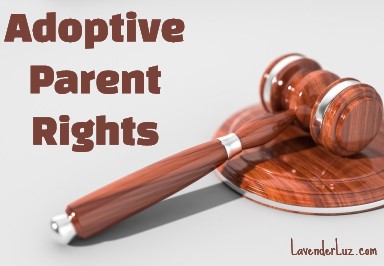
That got me thinking about the rights of the adoptive parent. And for this gentleman, a Texas Representative asking thoughtful questions during this hearing, I weigh in.
In the Eyes of the Law
I’m currently at this legal juncture of handing off rights. My oldest “child” just crossed the legal line into adulthood, and my second is not far behind. Never in this 18+ year journey have I felt less-than any other parent regarding my rights to raise my children as I see fit. Never have I felt threatened by the existence of my children’s other parents. Never have I worried I did not have enough control in the eyes of the law (In the eyes of my children? That’s another matter!)
Once our adoptions were finalized, my husband and I became “forever parents” in the eyes of the law. We have all the rights (and responsibilities) any other parent has. We get to make all decisions and we get to live with the consequences of those decisions. Hopefully, most of our decisions and all that flow from them will be beneficial for us and our kids, as we raise them from babyhood to adulthood.
Adoptive Parent Rights Are Not at Risk
None of my rights as an adoptive parent would change if my grown children decide to procure their original birth records from the State of Colorado (which opened records to all people in 2016). Even with my eldest crossing that legal line, I STILL do not feel less-than, threatened, or worried. I feel confident in our connection, no matter what comes.
There is nothing in Texas’ HB 2725, nor was there in Colorado’s bill 4 years ago, that abrogates my rights as an adoptive parent. On the contrary, we have found that having more information rather than less strengthens our bonds of connection rather than weakening them.
Aside: While it’s not exactly a right for me to have my children’s biology-related medical information, I have found it helpful in executing my responsibility around making health decisions for them (especially in a dynamic way, as medical conditions tend to emerge over the years for birth parents and birth grandparents).
What Opening Birth Records Doesn’t Do
- Unsealing birth records does nothing to open or close adoptions. The decision of whether or not to have contact with birth family, as well as how much, resides with adoptive parents while the child is a minor.
- Unsealing birth records neither encourages nor discourages relationships between adoptee and birth family. That’s a whole other issue.
- Unsealing birth records has no bearing on the integrity of relationship between adoptive parent and child. That’s up to the parent’s parenting, attuning, and connecting. Let’s remember that adoptive parents have an 18+ year head start to build a genuine (not merely legal) connection.
I’m guessing that last one is at the crux of many adoptive parent fears about possibly losing an adoptee to his/her birth family once all the hard work of raising a child to adulthood is done.
But I’m pretty sure this doesn’t happen in healthy, connected relationships. If the law is the main thing binding an adoptee to their adoptive parents, how strong is that connection really?
The Boogeyman
That’s the real tragedy for adoptive parents: fearing the unknown, the boogeyman (or, in this case, the specter of the boogey-birth mother) looming to swoop in and take away our rightful place in our kid’s life.
But if our sons and daughters are ours only because they can’t find information on their birth parents, well that’s a false sense of security. They are ours only because there is no other choice. They are truly ours when they have a choice and still want to have us alongside them in their lifelong journey. That takes connection, not power.
When I lead workshops for adoptive parents, I teach that as this power shift begins to occur in the tween/teen years, you want your son/daughter to WANT to include you on their journey, wherever it may lead. Kids are going to go through stuff. They are going to face decisions on monumental issues — drugs, alcohol, sex, and yes, even birth parents. Will they invite us to be alongside and guide them as they decide who and what to let into their lives? Or will they shut us out because it feels as though we oppose them, as though we assert power over them (even after they are legal adults)?
Other Points for Representatives Open to Learning
Adultness: Even non-adoptive parents wrestle with letting go of legal authority over their kids on their 18th birthday. But while being “forever parents” in the eye of the law is a given, being “forever parents” in the hearts of my son and daughter is a choice they will make. Over and over again during the course of their lives.
Equality: HB 2725 puts sons and daughters like mine on equal footing with other non-adopted adults. Restoring access to original birth records is the right thing to do, and any fragility on the part of adoptive parents should not trump the adoptee’s right to be treated equally under the law.
Practicality: Keeping records closed just makes people with natural curiosity go around the law (genealogy is the 2nd most popular hobby after gardening) . I’m sure you’ve heard stories of people taking alternate routes to uncover the early chapters of their lives, including DNA testing and Internet searches. Using these methods when the law stands in the way can cause unexpected turmoil and chaos for people in the birth family, the antithesis of this misguided old law’s intent. With current and emerging technology it’s an illusion to think we can keep information on birth records forever secret. It’s time for the law to get ahead of this.
Closure
How wonderful it is when our adult children have all their pieces and CHOOSE to have us along in their journey anyway. THAT is the deep connection adoptive parents are truly after. No boogey birth-parent can swoop in and take that away.
(I’m not saying anyone has to choose between birth family and adoptive family. In many cases, it works best for the adopted person to be able to claim and be claimed by both families. Adoptee math should be more about addition and multiplication than subtraction and division).
Finally, my friend Angela Tucker, adoptee, adoption professional and activist, encapsulates the issue of knowledge so brilliantly:
Adoptees fear the not-knowing, while adoptive parents fear the knowing.
— Angela Tucker of the documentary Closure
It’s Time
It’s time for adoptive parents to become secure enough in themselves that they don’t need to rely on the law to deprive their sons and daughters of a document others can get.
It’s time for peace of mind that comes from steadfast bonds and enduring connections.
It’s time, dear Texas representatives deciding its fate, to pass HB 2725.
While this bill did not survive the 2019 legislative session in Texas, advocates are preparing to bring it again in 2021 and right this injustice toward adopted people. Please see STAR, Support Texas Adoptee Rights for ways you can help and for updates.
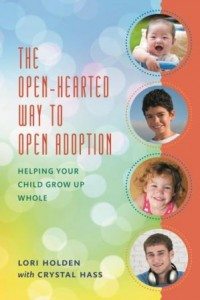
Lori Holden, mom of a young adult daughter and a young adult son, writes from Denver. She was honored as an Angel in Adoption® by the Congressional Coalition on Adoption Institute.
Her first book, The Open-Hearted Way to Open Adoption: Helping Your Child Grow Up Whole, makes a thoughtful anytime gift for the adoptive families in your life. Her second book, Standing Room Only: How to Be THAT Yoga Teacher is now available in paperback, and her third book, Adoption Unfiltered, is now available through your favorite bookseller!
Find Lori’s books on her Amazon Author page and catch episodes of Adoption: The Long View wherever you get your podcasts.

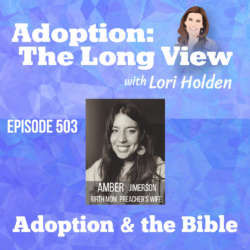
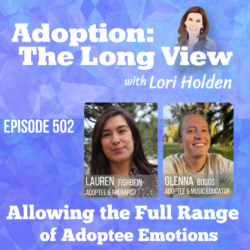
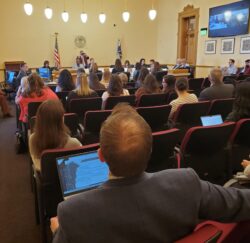
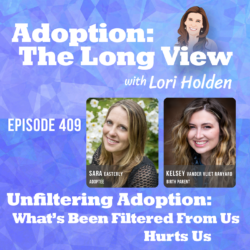

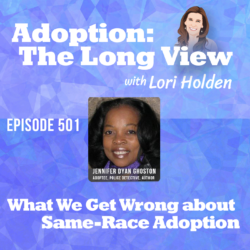

11 Responses
Adoptive mom of 2 kids, ages 7 & 13. Original birth certificates should never be sealed! As long as birth certificates are also used to prove legal parentage, the short form birth certificate should be amended, but all parents – legal, biological, and genetic – should be included on the long form.
My children having their OBCs does not infringe upon my rights. All adoptees should have the right to their own information.
The attorney for my son’s adoption actually sent us a copy of his OBC. I didn’t realize how valuable that was until a few years later, when I became aware of sealed records. I had to nag the attorney for my daughter’s adoption to give us her OBC. Why on Earth would anyone think that these pieces of paper have anything to do with my rights as a parent? Having them make my kids more whole.
You’ve done such an excellent job of breaking down this topic, Lori. I hope legislators are reading and understanding.
Adoptive mom and Texan! Love this article! Adoptees should have every right and privilege any other citizen has including and especially the right to their own records. It’s time to come out of the adoption dark ages and start considering the individual who had no choice in the matter.
Hear hear! We need to shift the focus off adoptive parents, and I’m glad that the focus of the bill was so heavily weighted toward adoptees that a rep had to ask the question about aparents. Seems like a little shift in the right direction.
From an adoptive parent – If you feel THAT threatened by your child finding out who their biological family is then you have no business adopting.
Adoptive parent here – We requested and obtained all of our son’s OBC, hospital records, and SS card at the time of placement. We want our child, when ready, to be able to have those things that were beyond his choice. Our bio children have their birth documents and our adopted son has BOTH original document and ones from joining our family. He will have the choice then if he wants to keep those.
Bravo Lori! You really made it all quite clear. And I agree, every adopted person deserves to know their history. It’s so very simple. (Adoptive parent here.)
I am an adoptive mom of a five year old. I am completely in favor of adoptees having access to their original birth certificate. My son’s birth-mom and both maternal grandparents are deceased, and birth-father is unknown. Fortunately, I had enough information from placement to locate a living biological aunt, with whom I now have frequent contact. Otherwise, my son would have no link to his ancestry. Adoptees should have as much information made available to them.
Honestly, my children having open access to THEIR OWN information is a right they should have! I made sure I had copies of their original birth certificates so that they wouldnt even need to go searching. It doesn’t threaten me, my feelings, my status as their mother, or anything else in the slightest. I keep all their original information and all the information I was given on their first parents in a fire safe, waiting for them. Should anything happen to this paperwork, it would pain me if they could not obtain copies for themselves from their states of birth. This practice of sealing records, keeping secrets, feeling threatened by knowledge, seems so archaic, and almost barbaric to me. Keep these records accessible to adoptees!
Adoptive parent of two here. Birth certificates should include both birth and adoptive parents and openness should be the default. That’s a better way to normalize adoption and “protect the construct” of our parenthood than to stand metaphorically in front of a locked door saying “nothing to see here.”
Even if it weren’t, these days sealing the birth certificate is not going to prevent children from finding their first parents no matter what anyone says about it. I’ve watched this play out with DNA sleuthing, even with someone who denied who denied his status right from the start and does not appear on the OBC.
If adoptive parents don’t want a personal relationship with birthparents, they don’t have to have one. Pretending those parents don’t exist–and trying to get their children to buy into that fantasy–is not OK and not sustainable. Our children will grow up and decide for themselves.
My kids are grown, and their adoptions were open. We feel just fine about our family construct.
Three cheers to this. I hope they pass it. If we all agree that communication and the flow of information is key in a healthy relationship, then it follows that kids should have access to their information. I love this: “we have found that having more information rather than less strengthens our bonds of connection rather than weakening them.”
Love this so much! Angela Tucker’s quote is beautiful in its simplicity and wisdom. You make such a great case for the importance of open records for adoptees, and letting go of insecurities in the fear of what open records could mean. I loved your statement of your adult children choosing connection over and over again, and that any adult child has this ability to choose the relationship with their parents, but that having relationships or knowledge about biological families doesn’t lessen the connection with adoptive parents. And “adoptee math,” I love it!